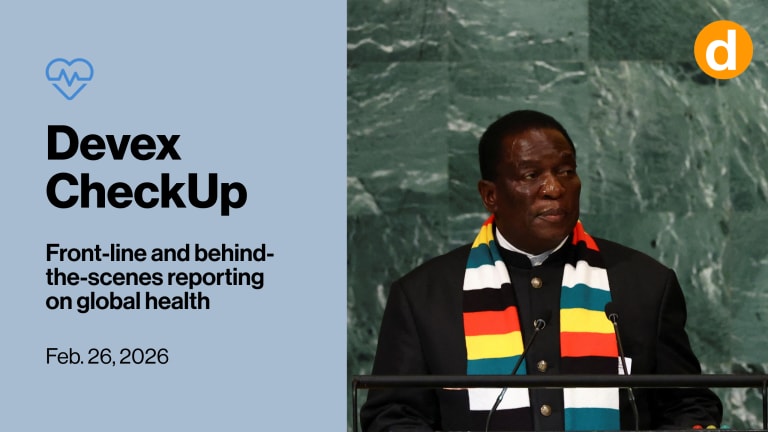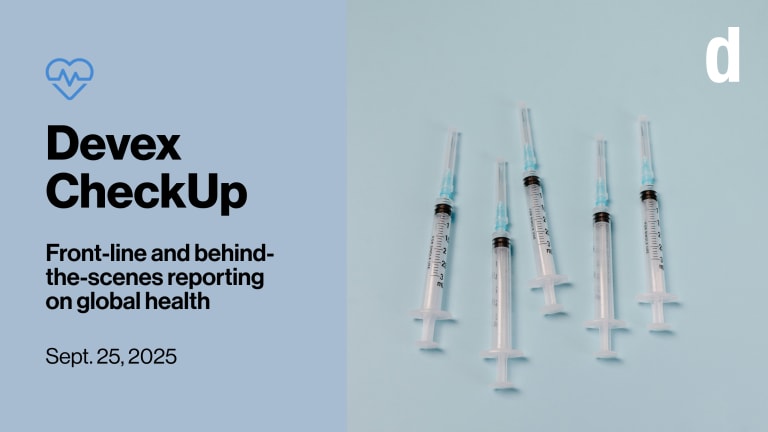John Nkengasong: First battle against HIV was won, but war isn't over
Dr. John Nkengasong, who leads the U.S. President's Emergency Plan for AIDS Relief, says that winning the second battle is dependent on political commitment.
In recent decades, the world won the first battle against HIV due to strong diplomacy and bipartisan political leadership, said Dr. John Nkengasong, who leads the U.S. President's Emergency Plan for AIDS Relief. But he emphasized that the world can’t take its eyes off the goal of eliminating HIV as a public health threat. “The fight is not over. The gains we've made over the years can easily be eroded,” he said, while on stage at Devex’s flagship event in Washington, D.C. One of the tactical challenges is sustaining political momentum amid the successes — there are now countless stories of people living full, happy lives with HIV. “That second phase is difficult because the enemy is not visible,” Nkengasong said. “If you fight any infectious disease, the tail end is always very, very challenging.” The first battle In the early days of the HIV epidemic the problem was incredibly palpable. “The enemy was very visible. When you went to a clinic in Uganda, Cameroon, Kenya, Botswana, you saw the ugly face of HIV. The skeleton of a human being on the bed with sunken eyes looking at you and saying: ‘Help me’ — but couldn't really say that — with a thin flesh over their body,” Nkengasong said. But then at the turn of the millennium, “something great was happening in the world,” he said. In 2000, the United Nations Security Council passed Resolution 1308 which characterized HIV as a security threat, and ultimately changed perceptions of the disease. The next year, Kofi Annan, secretary-general of the U.N. at that time, who Nkengasong called “one of the greatest diplomats,” urged for the creation of the Global Fund to fight AIDS, Tuberculosis and Malaria, telling African leaders that HIV threatens the future of development in their countries. “He reached out in his own checkbook and cut a check of $100,000 and that started the Global Fund,” Nkengasong said. “That is the power of diplomacy.” Then in 2003, U.S. President George W. Bush “took all of us by storm” during his State of the Union address when he launched PEPFAR, Nkengasong said. The initiative has since saved 25 million lives and prevented 5.5 million babies from being born infected. HIV has transformed from a life-threatening emergency to a manageable chronic disease. “We can proudly say that we won the first phase of the battle against HIV, which was that ugly face that we saw when we went to clinics in Cameroon, Botswana, Uganda,” he said. “Two lessons: good diplomacy, good politics.” The second battle Now, amid the second battle, it’s crucial to sustain gains made over the past two decades. It’s still a disease without a vaccine or cure. “I wake up every morning thinking of PEPFAR as the greatest act of humanity in solving infectious disease challenges. … This is our strongest soft diplomacy.” --— Dr. John Nkengasong, the U.S. global AIDS coordinator When the enemy is not visible it’s hard to ensure there’s political momentum — with enough programs, financing, and partnerships in place. Nkengasong urged politicians to not see achievements such as reaching thresholds including the UNAIDS target of having 95% of their population knowing their status, 95% of those who know their status on treatment, and 95% of those on treatment reaching viral suppression, as a national success against HIV but simply a progress indicator. There are still too many new infections each year, he said. “If you take your eyes off the ball … the gains that you've made over the years will be eroded,” Nkengasong said. And PEPFAR’s future remains uncertain as it faces another reauthorization next year by the U.S. Congress — which will happen in the wake of a divisive presidential election next month. But Nkengasong said PEPFAR has long enjoyed bipartisan support in the U.S. and his appeal to members of Congress is to not “let the good work go to waste.” “I wake up every morning thinking of PEPFAR as the greatest act of humanity in solving infectious disease challenges that I know of in the world — in the history of the world — driven by one single country,” Nkengasong said. “This is our strongest soft diplomacy.” Another challenge in the second phase of the war on HIV is legislation such as Uganda’s Anti-Homosexuality Act, passed last year, which obstructs access to HIV services for LGBTQ+ communities. Nkengasong said he’s had “very candid dialogues” with Ugandan President Yoweri Museveni, who had historically been respected as one of the architects of the HIV programs that helped turn the tide of the disease on the African continent. But Nkengasong said he told Museveni that this new law puts his legacy at risk. “That legacy will be remembered poorly,” he said. Update, Oct. 30, 2024: This article has been updated to clarify the UNAIDS 95-95-95 targets.
In recent decades, the world won the first battle against HIV due to strong diplomacy and bipartisan political leadership, said Dr. John Nkengasong, who leads the U.S. President's Emergency Plan for AIDS Relief.
But he emphasized that the world can’t take its eyes off the goal of eliminating HIV as a public health threat.
“The fight is not over. The gains we've made over the years can easily be eroded,” he said, while on stage at Devex’s flagship event in Washington, D.C.
This story is forDevex Promembers
Unlock this story now with a 15-day free trial of Devex Pro.
With a Devex Pro subscription you'll get access to deeper analysis and exclusive insights from our reporters and analysts.
Start my free trialRequest a group subscription Printing articles to share with others is a breach of our terms and conditions and copyright policy. Please use the sharing options on the left side of the article. Devex Pro members may share up to 10 articles per month using the Pro share tool ( ).
Sara Jerving is a Senior Reporter at Devex, where she covers global health. Her work has appeared in The New York Times, the Los Angeles Times, The Wall Street Journal, VICE News, and Bloomberg News among others. Sara holds a master's degree from Columbia University Graduate School of Journalism where she was a Lorana Sullivan fellow. She was a finalist for One World Media's Digital Media Award in 2021; a finalist for the Livingston Award for Young Journalists in 2018; and she was part of a VICE News Tonight on HBO team that received an Emmy nomination in 2018. She received the Philip Greer Memorial Award from Columbia University Graduate School of Journalism in 2014.








